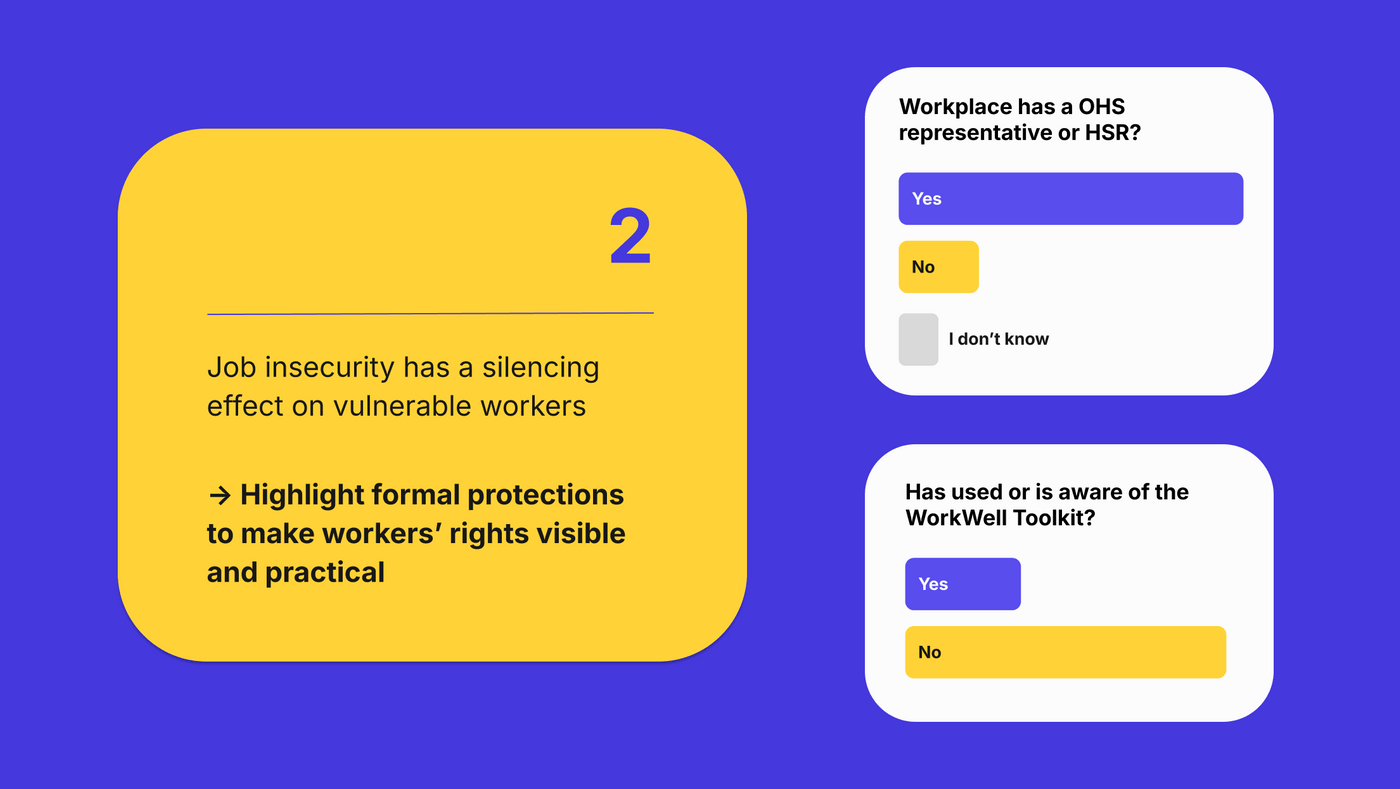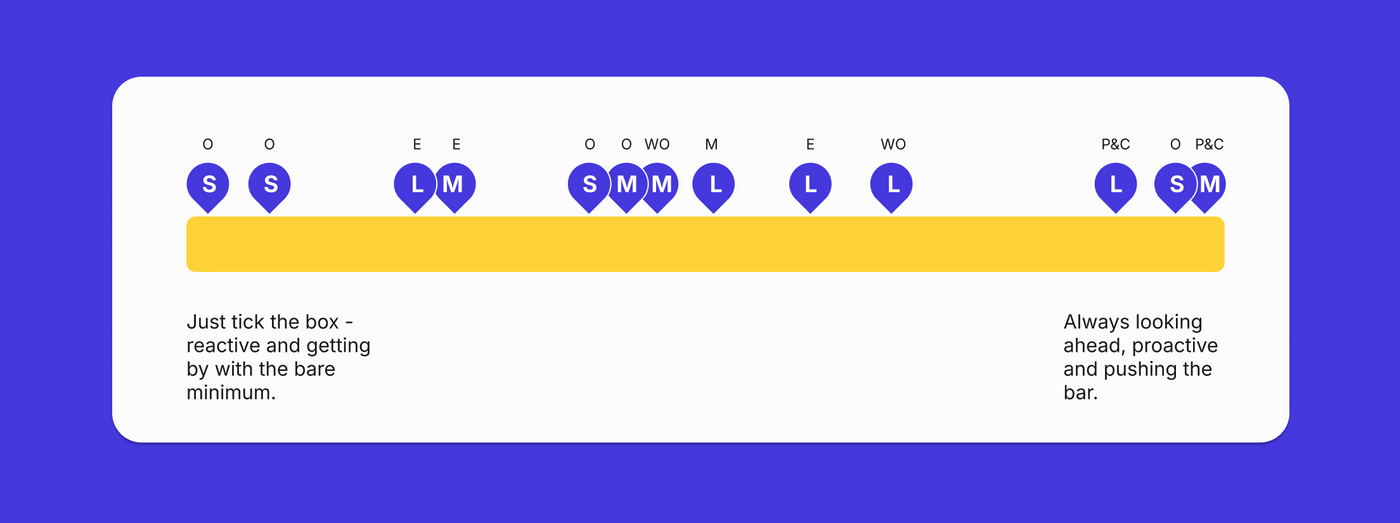WorkSafe Victoria partnered with Portable to better understand the target audiences for its WorkWell Toolkit. The Toolkit is an online resource designed to support workplaces with psychological health and safety. The project aimed to explore how people perceive psychological health and safety at work, their behaviours and motivations around it, and the challenges they face in implementing it in their workplace. The research also sought to understand what people need in order to support their workplaces to implement good psychological health and safety practices.
Portable emerged from this project as an ideal partner due to our capability to rapidly engage diverse participants, deliver trauma-informed qualitative research, and synthesise actionable, nuanced insights quickly and clearly. We not only surfaced valuable insights about organisational attitudes and motivations around psychological health but clearly articulated the "why" behind employer behaviours. Our collaborative approach ensured that WorkSafe’s key stakeholders were actively involved, providing regular feedback loops, enhancing both the quality and applicability of our findings.

The challenge
WorkSafe Victoria needed to move quickly to inform a significant update to its WorkWell Toolkit in preparation for upcoming legislative changes that would enhance workplace obligations around psychological health and safety.
Portable was brought in to lead targeted, time-sensitive research. A key challenge was ensuring the right people were involved, to understand the beliefs and behaviours of employers across Victoria’s diverse business landscape. We partnered with a recruitment agency to reach participants with diverse roles, experiences, and attitudes toward psychological health and safety (PHS), focusing on individuals with responsibilities or influence over psychological health and safety in their workplaces.
Given the sensitive nature of the topic, it was essential that we approached interviews in a trauma-responsive way. We took care to ensure our methods were respectful, safe, and grounded in empathy and care.
Although the sample size of 13 participants was small relative to the breadth of Victorian workplaces, it yielded rich insights. To ensure the research would be actionable, we focused on surfacing people’s specific needs when engaging with a tool like the WorkWell Toolkit. We explored from the kind of information they required and why, to how it should be structured and delivered, with the intention of creating clear and actionable insights for Worksafe Victoria.
The approach
We took a clear, time-efficient research approach to help WorkWell understand audience needs, motivations, and behaviours related to psychological health and safety at work. Our aim was to produce insight-rich findings that could feed directly into the next phase of updating the WorkWell Toolkit. The project was highly collaborative, and our process was structured to ensure regular input and feedback from WorkSafe across all key moments.
Discovery and immersion
We reviewed documentation provided by WorkSafe and conducted desktop research into psychological health and safety practices. This helped us quickly build a foundational understanding of the toolkit and the broader ecosystem it sits in.
Participant recruitment and collaborative research design
We partnered with a recruiter to source a diverse range of participants, including those who had responsibilities related to psychological health and safety at work. We developed a trauma-responsive interview guide and reviewed it with WorkWell to ensure clarity, appropriateness, and alignment with trauma-informed principles.
Interviewing
We conducted 13 semi-structured interviews with participants, each recorded using Otter.ai for transcription and reference. The sessions focused on surfacing motivations, behaviours, needs, and barriers related to workplace psychological health and safety.
Synthesis and insight development
Our team reviewed interview notes and transcripts to identify patterns, themes and insights. We used a prescribed structure and leveraged ChatGPT to support the drafting of early insight statements, which were refined and redrafted in the team to ensure specificity, detail, and human insight were captured.
Reporting and delivery
We created a report that included participant demographics, light quantitative data, key insights with supporting quotes, and actionable recommendations. This was followed by a presentation to WorkSafe, where we gathered feedback before delivering the final report.
The impact
This research provided WorkSafe Victoria with a clearer understanding of the people using the WorkWell Toolkit and their broader PHS content. It directly informed the next stage of their process: a review of the toolkit’s information architecture, an assessment of its current content and resources, and an evaluation of how these connect to related materials across the WorkSafe site.
The research also uncovered key insights into how people think about and engage with psychological health and safety; psychological health and safety in the workplace is deeply embedded in workplace culture, shaped more by trust, proactive leadership, and everyday behaviours than by policy alone. We found that many workplaces had matured in their understanding of mental health, recognising its link to staff retention, risk management, and overall organisational wellbeing. Across diverse sectors and business sizes, leaders who foster open communication, respond to individual needs, and embed care into everyday practices were better positioned to support psychological safety.
Importantly, we uncovered that readiness and capacity to engage with this topic varied widely, emphasising the need for tools that are not only compliant, but also practical, culturally responsive, and tailored to diverse workplace contexts. This is now shaping how WorkSafe plans to communicate on the topic, ensuring their messaging connects with the motivations and behaviours of their audiences.
We heard from the WorkSafe team that they appreciated the clarity, relevance, and usability of the insights, and the trauma-responsive approach we took, given the nature of the topic. In addition, some findings aligned with their existing research, which helped to affirm the direction their team was already heading in.

Testimonials and reflections
“Portable delivered high-quality, trauma-informed research under tight timeframes, helping us better understand the diverse needs and behaviours of Victorian employers around psychological health and safety. Their collaborative approach, thoughtful problem-solving, and commitment to representing all types of duty holders made the process seamless and impactful. The insights they provided are already shaping how we evolve the Work Well Toolkit. Thank you for your care, clarity, and partnership.”
- Georgia Gray, WorkWell Program Manager
“As a researcher on this project, I had the opportunity to speak with a range of people about their experiences with psychological health and safety at work. What stood out to me most was the genuine passion of the WorkSafe team to make real improvements in this space. It was rewarding to contribute to a project that’s not only grounded in empathy, but also aimed at making workplaces safer and more supportive.”
- Debra Cupitt, Portable
The project team
- Sarah Kaur, Principal Design Strategist
- Danielle Emond, Senior Producer
- Debra Cupitt, UX Researcher